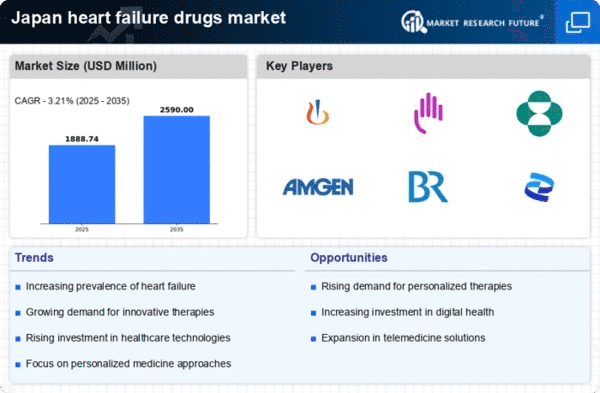Growing Awareness and Education
There is a notable increase in awareness and education regarding heart failure in Japan, which is influencing the heart failure-drugs market. Public health campaigns and initiatives by healthcare organizations are educating both patients and healthcare professionals about the importance of early diagnosis and treatment of heart failure. This heightened awareness is likely to lead to earlier interventions and increased demand for heart failure medications. As patients become more informed about their condition, they may actively seek out treatment options, thereby driving market growth. Additionally, healthcare providers are becoming more proactive in prescribing heart failure drugs, recognizing the need for effective management strategies. This trend suggests a positive outlook for the heart failure-drugs market as awareness continues to expand.
Advancements in Drug Development
Technological advancements in drug development are playing a crucial role in shaping the heart failure-drugs market in Japan. The integration of artificial intelligence and machine learning in drug discovery processes has accelerated the identification of potential therapeutic candidates. This innovation allows for more efficient clinical trials and a faster time-to-market for new heart failure medications. Furthermore, the Japanese government has been supportive of these advancements, providing funding and resources to facilitate research initiatives. As a result, the heart failure-drugs market is likely to witness an influx of novel therapies that can address unmet medical needs. The introduction of these advanced treatments may enhance patient adherence and improve overall health outcomes, thereby expanding the market further.
Increased Healthcare Expenditure
Japan's healthcare expenditure has been on the rise, which positively impacts the heart failure-drugs market. In 2025, healthcare spending is projected to reach approximately ¥42 trillion, reflecting a commitment to improving health services and access to medications. This increase in funding allows for better management of chronic diseases, including heart failure. As healthcare providers receive more resources, they can offer a wider range of treatment options to patients. This trend is likely to lead to higher adoption rates of heart failure medications, as patients gain access to innovative therapies that were previously unavailable. Consequently, the heart failure-drugs market is expected to benefit from this increased investment in healthcare.
Rising Incidence of Heart Failure
The heart failure-drugs market in Japan is experiencing growth due to the increasing incidence of heart failure among the population. Recent statistics indicate that approximately 1.5 million individuals in Japan are diagnosed with heart failure, a number that is projected to rise as the population ages. This growing patient base necessitates the development and availability of effective pharmacological treatments. As healthcare providers seek to manage this chronic condition, the demand for innovative heart failure therapies is likely to escalate. Consequently, pharmaceutical companies are investing in research and development to create new drugs that can improve patient outcomes. This trend is expected to drive the heart failure-drugs market significantly in the coming years, as more patients seek effective management options for their condition.
Regulatory Support for Innovative Therapies
Regulatory bodies in Japan are increasingly supportive of innovative therapies for heart failure, which is a key driver for the heart failure-drugs market. The Pharmaceuticals and Medical Devices Agency (PMDA) has streamlined the approval process for new drugs, particularly those that demonstrate significant clinical benefits. This regulatory environment encourages pharmaceutical companies to invest in research and development of novel heart failure treatments. As a result, the market is likely to see a surge in the introduction of new medications that can provide better management options for patients. The proactive stance of regulatory authorities not only fosters innovation but also enhances patient access to cutting-edge therapies, thereby contributing to the overall growth of the heart failure-drugs market.
















